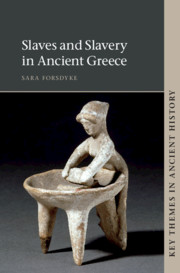Refine search
Actions for selected content:
23990 results in Ancient history
Note on Translations, Dates and Abbreviations
-
- Book:
- Slaves and Slavery in Ancient Greece
- Published online:
- 08 June 2021
- Print publication:
- 10 June 2021, pp xv-xv
-
- Chapter
- Export citation
Chapter 5 - Resourceful Slaves and Controlling Masters
-
- Book:
- Slaves and Slavery in Ancient Greece
- Published online:
- 08 June 2021
- Print publication:
- 10 June 2021, pp 200-246
-
- Chapter
- Export citation
Chapter 6 - Why Should We Care?
-
- Book:
- Slaves and Slavery in Ancient Greece
- Published online:
- 08 June 2021
- Print publication:
- 10 June 2021, pp 247-251
-
- Chapter
- Export citation
Dedication
-
- Book:
- Slaves and Slavery in Ancient Greece
- Published online:
- 08 June 2021
- Print publication:
- 10 June 2021, pp vii-viii
-
- Chapter
- Export citation
Tables
-
- Book:
- Slaves and Slavery in Ancient Greece
- Published online:
- 08 June 2021
- Print publication:
- 10 June 2021, pp xii-xii
-
- Chapter
- Export citation
Bibliography
-
- Book:
- Slaves and Slavery in Ancient Greece
- Published online:
- 08 June 2021
- Print publication:
- 10 June 2021, pp 255-270
-
- Chapter
- Export citation

Slaves and Slavery in Ancient Greece
-
- Published online:
- 08 June 2021
- Print publication:
- 10 June 2021
Indexes
-
- Book:
- Cicero: <I>Pro Milone</I>
- Print publication:
- 27 May 2021, pp 364-382
-
- Chapter
- Export citation
Dedication
-
- Book:
- Cicero: <I>Pro Milone</I>
- Print publication:
- 27 May 2021, pp v-vi
-
- Chapter
- Export citation
Works Cited
-
- Book:
- Cicero: <I>Pro Milone</I>
- Print publication:
- 27 May 2021, pp 346-363
-
- Chapter
- Export citation
Introduction
-
- Book:
- Cicero: <I>Pro Milone</I>
- Print publication:
- 27 May 2021, pp 1-50
-
- Chapter
- Export citation
List of Maps
-
- Book:
- Cicero: <I>Pro Milone</I>
- Print publication:
- 27 May 2021, pp viii-viii
-
- Chapter
- Export citation
Note on Conventions
-
- Book:
- Cicero: <I>Pro Milone</I>
- Print publication:
- 27 May 2021, pp xix-xx
-
- Chapter
- Export citation
List of Abbreviations, Editions, Commentaries, and Translations
-
- Book:
- Cicero: <I>Pro Milone</I>
- Print publication:
- 27 May 2021, pp xi-xiv
-
- Chapter
- Export citation
Commentary
-
- Book:
- Cicero: <I>Pro Milone</I>
- Print publication:
- 27 May 2021, pp 83-345
-
- Chapter
- Export citation
Frontmatter
-
- Book:
- Cicero: <I>Pro Milone</I>
- Print publication:
- 27 May 2021, pp i-iv
-
- Chapter
- Export citation
Contents
-
- Book:
- Cicero: <I>Pro Milone</I>
- Print publication:
- 27 May 2021, pp vii-vii
-
- Chapter
- Export citation
M. Tvlli Ciceronis Pro T. Annio Milone Oratio
-
- Book:
- Cicero: <I>Pro Milone</I>
- Print publication:
- 27 May 2021, pp 51-82
-
- Chapter
- Export citation
Preface
-
- Book:
- Cicero: <I>Pro Milone</I>
- Print publication:
- 27 May 2021, pp ix-x
-
- Chapter
- Export citation
Maps
-
- Book:
- Cicero: <I>Pro Milone</I>
- Print publication:
- 27 May 2021, pp xv-xviii
-
- Chapter
- Export citation
